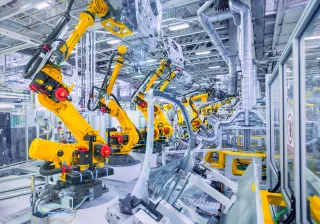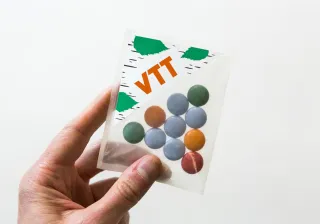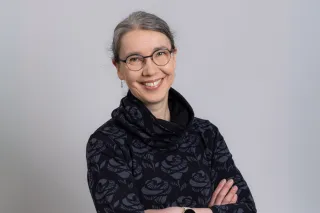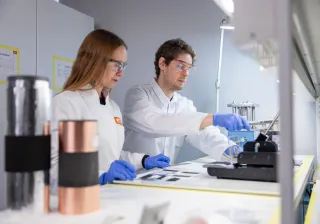Finnish sustainable development experts came together at VTT's annual sustainability seminar. It became clear that the goals of the global 2030 Agenda are still excellent, but the results are modest. Luckily, concrete achievements and system-level development are there. Exactly what we need.
Positive news first: Finland is number one in implementing the goals of the 2030 Agenda globally when we examine the sustainable development indicators reported by the UN. Despite this, Finland still has a lot to do, as Eeva Furman, Secretary-General of the Finnish National Commission on Sustainable Development, reminded us at VTT's VVV seminar (Vahva, Vahvempi, Vastuullinen; Strong, Stronger, Responsible) in November 2023.
Finland's challenges are particularly related to ecological sustainability, global responsibility and cross-border adverse effects, especially climate change, and terrestrial and aquatic life. This is what Jukka Hoffren, Research Manager at Statistics Finland, writes in their blog last July.
According to Hoffren, we are also in a recession in terms of good education. Finland is not necessarily doing well in eradicating poverty either, as the income of the lowest income groups is growing much more slowly than that of others.
Planned or forced by a crisis
Achieving the goals requires a systemic change and a sustainability transition. These are challenging to implement, but they will inevitably be realised, either as planned or forced by various crises when the limits of carrying capacity of the environment or social inequalities are met. At the VVV seminar, Eeva Furman suggested that we are increasingly moving towards a crisis society. This means that concrete measures should be accelerated.
Hanna Uusitalo, Environmental Director at Kone, noted in their keynote speech at the VVV seminar that change is not always difficult, but we need to make decisions about it. This is so true! In a human-created society, only humans can change things.
People have created innovations and other solutions to promote sustainability on a massive scale, but many of these have not been introduced and decisions are often only in the hands of few. Emma Winiecki from the UN Women Finland pointed out at the seminar that women, in particular, may not be allowed to make independent decisions on their reproductive health, for example.
Nor can we use the knowledge capital of women if we cannot improve the status and equality of women in general. It is concerning that we have achieved so little globally to improve the position of women.
Information, technology and understanding
In summer 2023, UN Secretary-General António Guterres reminded us that, throughout history, mankind has shown the ability to overcome the most serious challenges. They believe that we can gain strength from never having had as much knowledge, technologies and resources as we have now. At the VVV seminar, Eeva Furman said that our understanding has also increased.
In other words, there are more and more opportunities to create solutions, but the pace must be accelerated. Antti-Jussi Tahvanainen, Research Team Leader at VTT, also emphasised the importance of future-oriented skills in decision-making at the VVV seminar. Systematic anticipation creates solid facts on where the operating environment is going and how the development can be influenced.
Sustainable development will inevitably change the economic system, for instance. At the VVV seminar, Riina Bhatia, Research Scientist at VTT, discussed the doughnut economy and its application in business. Simplified, the doughnut model refers to an economic model that does not emphasise continuous growth. According to Bhatia, business models for this exist.
Perhaps business could be created based on frugal innovations, some of which were presented to us at the seminar by Hanna Saari, Research Scientist at VTT. Fruitful innovations are based on the idea of producing more for less. They could have markets in developing countries where the implementation of the 2030 Agenda is particularly low.
Engaging people through artificial intelligence
New economic systems and other systemic changes are increasingly based on the opportunities of digitalisation, which has long been one of the megatrends of our time. Artificial intelligence is one of the strongest emerging technologies in this trend, and its development highlights growing opportunities but also concerns, as are other technologies that change established practices.
At the VVV seminar, Arash Hajikhani, Team Leader at VTT, reminded us that the value of artificial intelligence is in people. Artificial intelligence works with the data we all produce by explaining our own preferences and needs. In this way, artificial intelligence, for example, increases inclusion, which means that different people's perspectives and life models can be considered.
The panel discussion at the VVV seminar highlighted that wars and the Covid19 pandemic have contributed to slowing down and hampering the implementation of the 2030 Agenda. This reminds us that one of the many objectives of the programme – cooperation and partnership – should be our central objective. We were able to follow the development of cooperation soon after the VVV seminar, as the same themes were discussed at the COP28 UN Climate Change Conference in Dubai.
Sustainability has become a major focus of business and societal decisions alike, and many concrete actions have been initiated – especially on climate and the environment. This is a good place to start speeding things up, because by working together and developing global supply chains sustainably, we can make the world better for us all.









